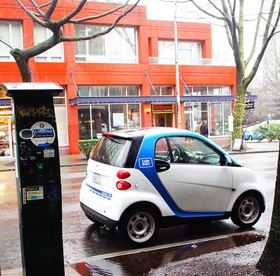 These days I make my home in Belltown; I shed my house-and-two-car life in Madrona over a decade ago. Metro, cabs and lifts from friends have helped to fill the motorized transportation holes; together with a scooter I bought for short rides. And now there's another way for me to get around: short-term, one-way car rentals from Car2Go.
These days I make my home in Belltown; I shed my house-and-two-car life in Madrona over a decade ago. Metro, cabs and lifts from friends have helped to fill the motorized transportation holes; together with a scooter I bought for short rides. And now there's another way for me to get around: short-term, one-way car rentals from Car2Go.
An app shows you where the nearest cars are parked. Click to reserve, use a membership card to unlock the car, and away you go. When you're done, lock the car and leave it. Wherever you go within Car2Go's Seattle home area. No worrying about parking, as with ZipCar: Car2Go has purchased year-long parking passes for every one of its cars to offset the city's "lost" revenue. Most of its vehicles are used several times a day and if a car doesn't move for 24 hours, a technician will go out and reposition it to where it's more likely to be useful.
"The idea is for our members to have a car within a five minute walk," says Car2Go president Nicholas Cole, who visited Seattle last week to look over his newest baby.
The new kid on the block is owned by German auto maker Daimler AG, the parent company of Mercedes Benz cars, trucks and buses; former owner of Chrysler; and maker of both Maybach super-luxury limos (to be phased out this year) and urban darling Smart cars (going gangbusters).
The Smart "ForTwo" model provides the rolling stock for Car2Go, which launched in Seattle with 330 cars less than a month ago. By comparison, Berlin has 1,000 cars. In all, a quarter-million members in 18 cities across Europe, Canada and the United States share 5,500 cars.
Car2Go is part of a growing American trend -- sharing stuff -- that the Wall Street Journal took a sideways glance at last weekend. "New Ventures Promote Communal Rides, Dinners; Trading Dresses and Leftovers," reported the paper. Its tone reflected the bemused, slightly mocking attitude that the conservative outlet often adopts toward social innovations.
What were people sharing? A meal of mac-and-cheese in a suburban home, expensive dresses you could rent for a weekend, couch-surfing apps and ride-sharing. Predictably, the online comment trolls called such behavior manifestations of Marxism and Communism. Surprisingly, the WSJ piece ignored an important and fast-growing trend: So-called "sharing" by corporations and manufacturers; particularly the sharing of high pricetag purchases like cars and vacation homes.
An economist (or a tax collector) might argue that businesses like Zipcar and Car2Go are not genuine "car-sharing" companies at all, but snazzy "car-rental" enterprises that cloak themselves in the feel-good buzzwords of the so-called sharing economy, that they are, in fact, part of something called "access-based consumption."
Manufacturers like Daimler have everything to gain by inserting their own vehicles into car-sharing programs. Zipcar is being acquired by Avis for $500 million; General Motors and Hertz both have their own short-term rental programs. BMW last year launched DriveNow in San Francisco with its Active-E electric cars, along with ParkNow, an app that directs users to prepaid spots in private garages.
The real future of shared transportation, marketing scholars predict, is actual peer-to-peer car sharing: you borrow someone's pickup, minivan or Ferrari for a while. Obviously, there are enormous logistical issues (liability insurance, for starters), but nothing that can't be solved ... that hasn't already been solved. Several sites are already active: car-sharing services such as Wheelz, RelayRides, and Getaround.
RelayRides, owned by General Motors, has partnered with OnStar to assist drivers in case of remote breakdowns. SideCar.com offers donation-based carpooling services in cities along the west coast. Liftshare.com is more like a Craigslist bulletin board.
In fact, the practical no longer has to be at war with the glamorous. RentTheRunway.com offers "couture without the cost;" it's a three-year-old website that lets women borrow haute couture dresses for a couple of days for about ten percent of the retail price. (Guys: just go rent a tux.) Another is called 99Dresses.com, which lets women trade clothes whenever they want. AirBnB highlights sumptuous second homes among its budget lodgings.
Getaround, the car-sharing site, lets members "borrow," among other vehicles, a bright red Tesla roadster for $50 an hour. Sad to say, it's in San Francisco.
Leave a comment